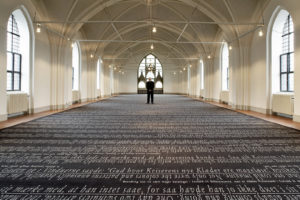He approaches us at the Chevron station on the corner of Rosecrans and Sepulveda, where, on a clear day, you can see the skyscrapers of downtown L.A. cupped in the palm of the San Gabriel mountains, and overhead the planes queued up in the vast expanse of blue sky, waiting to land at LAX. Vinny, one of the kids I take care of, and I are having fun using the squeegee to clean the windows of the van, when he walks up. He tells us that he, his wife, and son are in town from the Midwest. His wife’s purse was stolen from their car, and they are stranded with no resources to fall back on, all their money was in her purse, and they’re hungry, and can we help? I look at Vinny, who is watching everything with his wide 10 year old eyes, which have not had much exposure to people in need. I look at the man who has–for whatever reason–dared to ask me for help, putting me in a powerful position. The story doesn’t fully add up to me. My internal logic is racing with questions: You said you were in California visiting family, can’t they help you? You have no credit cards? No bank accounts? What about your wallet? Was that stolen too? And there I find myself, deciding if someone is worthy of my help.
I’ve heard so many times not to give money to people who ask for it because they will use it to buy drugs, alcohol, etc. Ideally, if someone asks me for money, I ask if I can buy them a meal, bus pass, gas, or whatever it is they need–but even then, someone might be lying to me. Someone with a sign that says they are out of a job, might just be too lazy to work. Someone who says he’s a veteran, might never have served our country at all. And yes, on the occasion that I do not have the time or opportunity to buy someone a meal, they might use the money I give them to buy addictive substances. I think it’s alright.
I remember sitting in a classroom at Biola, debating with a girl who insisted it was wrong to give money to homeless people because of what they might do with it, when it hit me: we don’t give to people because of who they are or what they will do with what we give them. We give because we are called to be like our Father in Heaven–who gives freely to so many people who throw away His blessings. How many full, and valuable days has God given me to live which I have wasted? Time, money, health, education–all things that have been given to me that I have not always used wisely, that I’ve often squandered. And yet it has been given to me because of who God is, not because I deserve it. I am called to be like my Heavenly Father–to inhabit the posture of gracious giving.
Ultimately, I am responsible for what I do. When someone asks for my help, do I help? I know that throwing money at homeless people is not about to solve the systemic problems of homelessness, poverty, addiction, or loneliness. Those are overarching themes that must be confronted in relentless and creative ways by Christians individually and by the Church as whole–to work for the healing of great tragedies in our society. But there are also the moments, the singular, individual moments when one encounters someone in need and must choose: to help or not to help? I want to help–whether someone is telling me the truth or not; whether someone will abuse my gift or not.
We walk with the man, his wife, and son inside the gas station’s store. We buy them hot dogs, chips, drinks, and the little boy–7 years old–gets a Slurpee. They thank us profusely, and we say we’re happy we can help. In the van, Vinny, his eyes shining, says, “That was nice, they were so nice…” and then after a pause, the warm glow of helping someone slightly fading, he asks me in a more troubled voice, “What if they were lying?” “It doesn’t matter,” I say, “We’ll never know, and I would rather help someone who is lying to me than say no to someone who is telling me the truth. But whether they told us the truth or not, they still needed help, and God has given us enough to help them.”
Whether I buy a meal for a stranger, or give a homeless person money, I always try to pray with them. I’m not trying to convert them–I’m just trying to give them the slightest glimpse of the God who loves them so much more than I ever can. I want them to see the God who moves me, and to have hope–a small seed of hope–planted in their heart that the Creator of the universe just might care for them, and love them more than they could ever imagine.





Leave a Reply
Your email is safe with us.